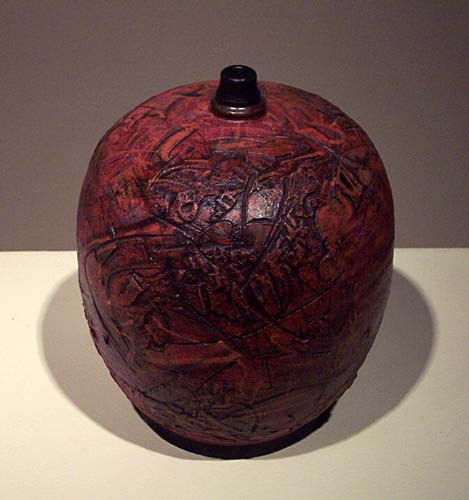|
|
|
Porcelain Bottle |
 |
|
Bottle Form
|
For Further Information Contact
Regis C. Brodie, 27 Wedgewood Drive, Saratoga Springs, NY 12866 518-584-5514 fax 518-226-0914 rbrodie@skidmore.edu www.brodieco.comRegis C. Brodie
I strongly believe in the power of a positive attitude and the ability to be flexible enough to respond to the creative opportunities that present themselves along the way, even when they're headed in an opposite direction. The making of art doesn't always go in a straight line and for me the true challenge is to see the many possibilities in the materials, the forming processes and the myriad effects that the firing and finishing can contribute to the energy and vitality of the piece.
I would characterize my ceramic vessel forms as elegant and classical. The painting, drawing, and sculptural surface treatment on the other hand, is out of the Abstract Expressionism and Post Modernist Schools. I love the interplay that is created between the refinement of the form and the spontaneously decorated surface. It contrasts the elegant with the organic. However, I do not establish a hierarchy or dominance of the form (mass) verses the surface (decoration). For, as I consider the form, the surface reveals itself as it becomes intrinsic and essential to the whole. The materials and the process of construction inspire and direct this unified sentiment and reveals its oneness of spirit. I am tight and the same time loose. Undoubtedly my contrasting Scottish and Italian heritage is behind the contrasting qualities in my work.
I prefer to work on a series of similar pieces. This gives me the opportunity to explore minor variations in contour and surface treatment. This focus allows me to achieve a heightened level of intuitiveness and aesthetic sensibility. The commitment to the work is sustained and regular and therefore maintains this elevated level of awareness and clarity.
Over the years, I have worked with a verity of clays, forming techniques and firing processes. I do this to establish, expand, broaden and personalize my visual vocabulary. The painting and sculpture work that I also so adds to this rich and diverse journey which has and continues to challenge and stimulate my sense of creative expression. I try not to limit the scope or direction of my imagination. My mentor and former professor, Rudy Staffel, would say, "When you change the process, you change the product."
The difficult part of making art, or for that matter, seeking the best outcome in any activity, is being able to recognize potential -- the obscure as well as the obvious. Is it mold or penicillin? Seeing the potential is the genius.
|
|
|
Porcelain Bottle |
 |
|
Bottle Form
|
For Further Information Contact
Regis C. Brodie, 27 Wedgewood Drive, Saratoga Springs, NY 12866 518-584-5514 fax 518-226-0914 rbrodie@skidmore.edu www.brodieco.com